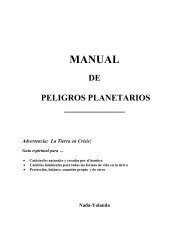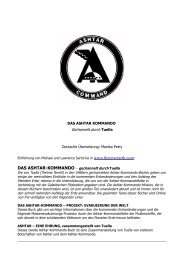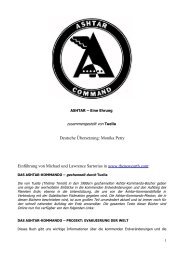ALIEN INTERVIEW - THE NEW EARTH - Earth Changes and The ...
ALIEN INTERVIEW - THE NEW EARTH - Earth Changes and The ...
ALIEN INTERVIEW - THE NEW EARTH - Earth Changes and The ...
Create successful ePaper yourself
Turn your PDF publications into a flip-book with our unique Google optimized e-Paper software.
Nazi War Finance <strong>and</strong> Banking Our Economy in War. Cambridge, Massachusetts:<br />
National Bureau of Economic Research, 1944. Paperback: ASIN B000J0VXBG.<br />
<strong>The</strong> Nazi Economic System: Germany's Mobilization for War. New York: Russell &<br />
Russell, 1971. Hardcover textbook: ISBN 0-846-21501-2, ISBN 978-0-84621-501-1"<br />
-- Reference: Wikipedia.org<br />
188 "...Bloodletting..."<br />
"Bloodletting is one of the oldest medical practices, having been practiced among diverse<br />
ancient peoples, including the Mesopotamians, the Egyptians, the Greeks, the Mayans, <strong>and</strong><br />
the Aztecs. In Greece, bloodletting was in use around the time of Hippocrates, who mentions<br />
bloodletting but in general relied on dietary techniques. Erasistratus, however, theorized that<br />
many diseases were caused by plethoras, or overabundances, in the blood, <strong>and</strong> advised<br />
that these plethoras be treated, initially, by exercise, sweating, reduced food intake, <strong>and</strong><br />
vomiting. Herophilus advocated bloodletting. Archagathus, one of the first Greek physicians<br />
to practice in Rome, practiced bloodletting extensively <strong>and</strong> gained a most sanguinary<br />
reputation.<br />
<strong>The</strong> popularity of bloodletting in Greece was reinforced by the ideas of Galen, after he<br />
discovered the veins <strong>and</strong> arteries were filled with blood, not air as was commonly believed at<br />
the time. <strong>The</strong>re were two key concepts in his system of bloodletting. <strong>The</strong> first was that blood<br />
was created <strong>and</strong> then used up, it did not circulate <strong>and</strong> so it could 'stagnate' in the<br />
extremities. <strong>The</strong> second was that humoral balance was the basis of illness or health, the four<br />
humours being blood, phlegm, black bile, <strong>and</strong> yellow bile, relating to the four Greek classical<br />
elements of air, water, earth <strong>and</strong> fire. Galen believed that blood was the dominant humour<br />
<strong>and</strong> the one in most need of control. In order to balance the humours, a physician would<br />
either remove 'excess' blood (plethora) from the patient or give them an emetic to induce<br />
vomiting, or a diuretic to induce urination.<br />
Bloodletting was especially popular in the young United States of America, where Benjamin<br />
Rush (a signatory of the Declaration of Independence) saw the state of the arteries as the<br />
key to disease, recommending levels of blood-letting that were high, even for the time.<br />
George Washington was treated in this manner following a horseback riding accident:<br />
almost 4 pounds (1.7 litres) of blood was withdrawn, contributing to his death by throat<br />
infection in 1799."<br />
-- Reference: Wikipedia.org<br />
189 "... you will find "evolution" mentioned in the ancient Vedic Hymns..."<br />
"<strong>The</strong> Vedas are very exhaustive scriptures. Each Veda contains several sections <strong>and</strong><br />
thous<strong>and</strong>s of hymns. Some of the Vedic hymns, especially the hymns of the Rig Veda, are<br />
considered to be at least 6000-8000 years old.<br />
<strong>The</strong> Vedas are believed to be revealed scriptures, because they are considered to be<br />
divine in origin. Since they were not written by any human beings but were only heard<br />
in deep meditative states, they are commonly referred as srutis or those that were heard."<br />
-- Reference: http://www.hinduwebsite.com/vedicsection/vedichymns.asp<br />
285





